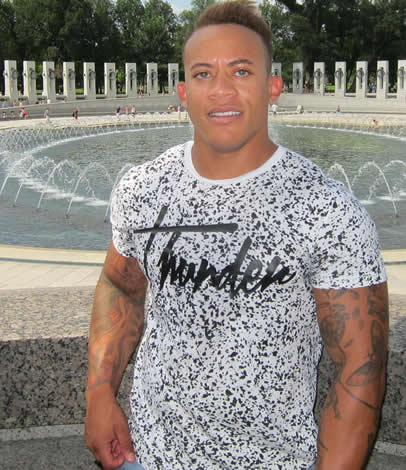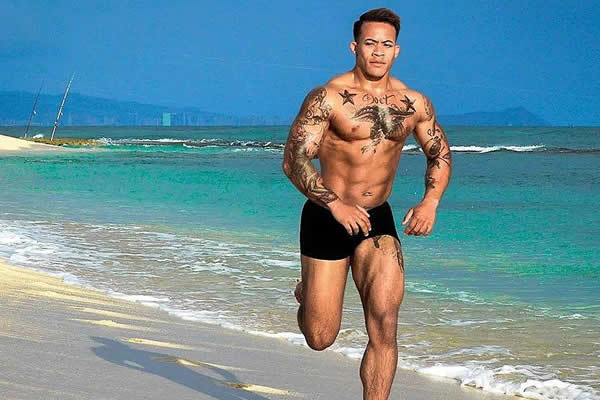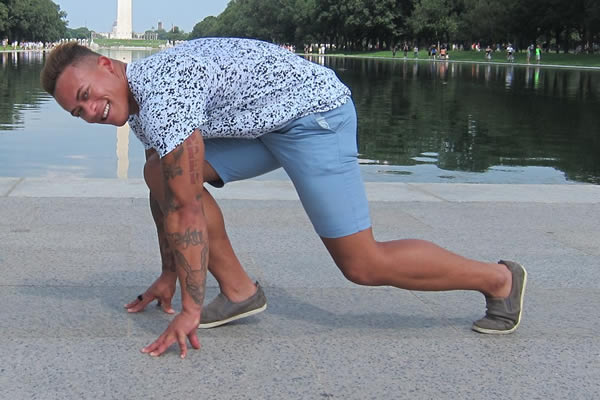Sports
Transgender Iraq vet competes in new arena
Ortega moves from the battlefield to pro bodybuilding


Sgt. Shane Ortega has served for more than 10 years in the military and is now an accomplished bodybuilder. (Photo courtesy ACLU)
When you first meet Sgt. Shane Ortega, the first things you notice are his muscles and tattoos. They are everywhere and it’s hard not to stare longer than the socially acceptable amount of time. Ortega is in D.C. for a series of briefings at the Pentagon and after multiple days of what he calls verbal ping-pong, he is ready to relax and do some sightseeing.
As he walks along the path next to the Reflecting Pool on the National Mall, each person that approaches from the opposite direction takes stock of him as they pass by. The reason they are looking isn’t because he is a trans man, they are looking at him because he has presence.
That presence has served him well during the past six years of quietly advocating for LGBT policy in the military. It began with work on the repeal of “Don’t Ask, Don’t Tell” and progressed into policy for transgender military service members. That advocacy has included meeting with civilians outside of the military chain of command such as politicians, the American Medical Association, SPARTA and the American Civil Liberties Union, among others.
“There is no road map for policy change,” Ortega says. “The timeline has accelerated since DADT and the people in power have refreshed. We are not the boogeyman anymore.”
Ortega just passed his 10-year anniversary in the armed forces and has been deployed twice to Iraq with the Marines as a woman and once to Afghanistan with the Army as a man. He is a Helicopter Flight Engineer in the Army’s 25th Infantry Division stationed at the Garrison base in Oahu, though elevated testosterone levels have relegated him to administrative work for the time being.
Throughout the course of this year, each of the military services has elevated its transgender separation policy outside of the military chain of command to third-party civilians. Just a few days after Ortega finished the last of his briefings, the Pentagon announced plans to lift the ban on transgender people serving in the U.S. military. After working in obscurity for years, Ortega is now one of the faces of the trans military movement.
The second thing you notice about Ortega when you meet him is that he is a ball of energy and he really likes to talk. As he treks toward the war memorials on the National Mall, his stories jump from music to scuba diving to his tours of duty to his uncles, all at breakneck speed. He is well spoken, engaging and funny. When he stops to admire the Vietnam Women’s Memorial, he mentions that he loves to sculpt things with clay.
The man knows a thing or two about sculpting other things as well.
Two months ago in Honolulu, he participated in his first physique competition and placed fourth, which qualified him for a spot at junior nationals in March of 2016. Sports and weightlifting had been a part of his regimen for years but it wasn’t until his body started filling out from hormone therapy that he began to think about competing.
Ortega was born in Maryland and moved around a lot growing up, living on bases with his mom or with family members while she was deployed overseas. He began wrestling in elementary school and picked the sport up again in high school along with track and field and soccer. After enlisting in the Marines he played intramural soccer and rugby on the bases.
A constant pursuit from sophomore year of high school on was weightlifting.
His high school wrestling coach started him out with the physiology of working out, which advanced to benching for form and finally lifting for bodybuilding. His heroes were the superstars of the World Wrestling Federation.
“I grew up with posters of Hulk Hogan and Randy Savage on my bedroom walls,” says Ortega. “I was into that good ‘ole American hero image.”
The weight training continued throughout his military career and escalated to a point where people were asking him if he was competing. After contacting the event organizers of National Physique Competition, Ikaika and the governing body to receive permission to enter the event, Ortega began serious training to compete in the men’s physique Class A.
Each morning started with physical training with his Army unit, the Hill Climbers, and included calisthenics and 15-25 miles of running per week. After work there were three to four sessions per week of weightlifting, two with a trainer. He says the hardest part of the preparation was starting the diet two months out from the competition and jumping to 300 grams of protein per day.

Shane Ortega (Photo by Kevin Majoros)
“I was really anxious the week before my competition. As the time came for me to compete, I realized how important it was for me as a trans man to compete at that level,” Ortega says. “Everyone was really nice and respectful at the event and I couldn’t have asked for a better experience for my first competition. It was a huge self-confidence boost.”
Ortega’s overall goal for the competition was to finish in the top three and qualify for nationals. He will attempt to accomplish that in his second competition at the Paradise Cup in September. “I believe that you can be anything you want to be in this country,” says Ortega. “If you want to become an elite athlete, find your opportunity and pursue it.”
As the day of sightseeing in D.C. winds down, Ortega begins to explain some of the tattoos on his body. He says they all have meaning to him. There is a woman wearing a gas mask, a grenade, nautical stars, Hindu goddesses and an Army tank.
When asked why the tank, he gets a huge grin on his face and exclaims, “Dude, there is an Army tank on my arm. How cool is that?”
Just like Sgt. Shane Ortega, that is in fact, pretty cool.

Shane Ortega (Photo by Kevin Majoros)
Sports
Attitude! French ice dancers nail ‘Vogue’ routine
Cizeron and Fournier Beaudry strike a pose in memorable Olympics performance

Madonna’s presence is being felt at the Olympic Games in Italy.
Guillaume Cizeron and his rhythm ice dancing partner Laurence Fournier Beaudry of France performed a flawless skate to Madonna’s “Vogue” and “Rescue Me” on Monday.
The duo scored an impressive 90.18 for their effort, the best score of the night.
“We’ve been working hard the whole season to get over 90, so it was nice to see the score on the screen,” Fournier Beaudry told Olympics.com. “But first of all, just coming out off the ice, we were very happy about what we delivered and the pleasure we had out there. With the energy of the crowd, it was really amazing.”
Watch the routine on YouTube here.
Italy
Olympics Pride House ‘really important for the community’
Italy lags behind other European countries in terms of LGBTQ rights

The four Italian advocacy groups behind the Milan Cortina Winter Olympics’ Pride House hope to use the games to highlight the lack of LGBTQ rights in their country.
Arcigay, CIG Arcigay Milano, Milano Pride, and Pride Sport Milano organized the Pride House that is located in Milan’s MEET Digital Culture Center. The Washington Blade on Feb. 5 interviewed Pride House Project Manager Joseph Naklé.
Naklé in 2020 founded Peacox Basket Milano, Italy’s only LGBTQ basketball team. He also carried the Olympic torch through Milan shortly before he spoke with the Blade. (“Heated Rivalry” stars Hudson Williams and Connor Storrie last month participated in the torch relay in Feltre, a town in Italy’s Veneto region.)
Naklé said the promotion of LGBTQ rights in Italy is “actually our main objective.”
ILGA-Europe in its Rainbow Map 2025 notes same-sex couples lack full marriage rights in Italy, and the country’s hate crimes law does not include sexual orientation or gender identity. Italy does ban discrimination based on sexual orientation in employment, but the country’s nondiscrimination laws do not include gender identity.
ILGA-Europe has made the following recommendations “in order to improve the legal and policy situation of LGBTI people in Italy.”
• Marriage equality for same-sex couples
• Depathologization of trans identities
• Automatic co-parent recognition available for all couples
“We are not really known to be the most openly LGBT-friendly country,” Naklé told the Blade. “That’s why it (Pride House) was really important for the community.”
“We want to use the Olympic games — because there is a big media attention — and we want to use this media attention to raise the voice,” he added.

Naklé noted Pride House will host “talks and roundtables every night” during the games that will focus on a variety of topics that include transgender and nonbinary people in sports and AI. Another will focus on what Naklé described to the Blade as “the importance of political movements now to fight for our rights, especially in places such as Italy or the U.S. where we are going backwards, and not forwards.”
Seven LGBTQ Olympians — Italian swimmer Alex Di Giorgio, Canadian ice dancers Paul Poirier and Kaitlyn Weaver, Canadian figure skater Eric Radford, Spanish figure skater Javier Raya, Scottish ice dancer Lewis Gibson, and Irish field hockey and cricket player Nikki Symmons — are scheduled to participate in Pride House’s Out and Proud event on Feb. 14.
Pride House Los Angeles – West Hollywood representatives are expected to speak at Pride House on Feb. 21.
The event will include a screening of Mariano Furlani’s documentary about Pride House and LGBTQ inclusion in sports. The MiX International LGBTQ+ Film and Queer Culture Festival will screen later this year in Milan. Pride House Los Angeles – West Hollywood is also planning to show the film during the 2028 Summer Olympics.
Naklé also noted Pride House has launched an initiative that allows LGBTQ sports teams to partner with teams whose members are either migrants from African and Islamic countries or people with disabilities.
“The objective is to show that sports is the bridge between these communities,” he said.
Bisexual US skier wins gold
Naklé spoke with the Blade a day before the games opened. The Milan Cortina Winter Olympics will close on Feb. 22.
More than 40 openly LGBTQ athletes are competing in the games.
Breezy Johnson, an American alpine skier who identifies as bisexual, on Sunday won a gold medal in the women’s downhill. Amber Glenn, who identifies as bisexual and pansexual, on the same day helped the U.S. win a gold medal in team figure skating.
Glenn said she received threats on social media after she told reporters during a pre-Olympics press conference that LGBTQ Americans are having a “hard time” with the Trump-Vance administration in the White House. The Associated Press notes Glenn wore a Pride pin on her jacket during Sunday’s medal ceremony.
“I was disappointed because I’ve never had so many people wish me harm before, just for being me and speaking about being decent — human rights and decency,” said Glenn, according to the AP. “So that was really disappointing, and I do think it kind of lowered that excitement for this.”
Puerto Rico
Bad Bunny shares Super Bowl stage with Ricky Martin, Lady Gaga
Puerto Rican activist celebrates half time show

Bad Bunny on Sunday shared the stage with Ricky Martin and Lady Gaga at the Super Bowl halftime show in Santa Clara, Calif.
Martin came out as gay in 2010. Gaga, who headlined the 2017 Super Bowl halftime show, is bisexual. Bad Bunny has championed LGBTQ rights in his native Puerto Rico and elsewhere.
“Not only was a sophisticated political statement, but it was a celebration of who we are as Puerto Ricans,” Pedro Julio Serrano, president of the LGBTQ+ Federation of Puerto Rico, told the Washington Blade on Monday. “That includes us as LGBTQ+ people by including a ground-breaking superstar and legend, Ricky Martin singing an anti-colonial anthem and showcasing Young Miko, an up-and-coming star at La Casita. And, of course, having queer icon Lady Gaga sing salsa was the cherry on the top.”
La Casita is a house that Bad Bunny included in his residency in San Juan, the Puerto Rican capital, last year. He recreated it during the halftime show.
“His performance brought us together as Puerto Ricans, as Latin Americans, as Americans (from the Americas) and as human beings,” said Serrano. “He embraced his own words by showcasing, through his performance, that the ‘only thing more powerful than hate is love.’”
-

 Opinions5 days ago
Opinions5 days agoUnconventional love: Or, fuck it, let’s choose each other again
-

 National4 days ago
National4 days agoFour bisexual women on stereotypes, erasure, representation, and joy
-

 Theater4 days ago
Theater4 days agoMagic is happening for Round House’s out stage manager
-

 Baltimore2 days ago
Baltimore2 days ago‘Heated Rivalry’ fandom exposes LGBTQ divide in Baltimore




















